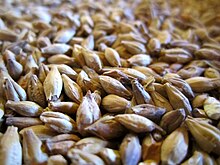чуж
Jump to navigation
Jump to search
Komi-Zyrian
[edit]
Pronunciation
[edit]Noun
[edit]чуж • (ćuž)
Declension
[edit]| Declension of чуж (stem: чужй-) | |||
|---|---|---|---|
| singular | plural | ||
| nominative | чуж (ćuž) | чужъяс (ćužjas) | |
| accusative | I* | чуж (ćuž) | чужъяс (ćužjas) |
| II* | чужйӧс (ćužjös) | чужъясӧс (ćužjasös) | |
| instrumental | чужйӧн (ćužjön) | чужъясӧн (ćužjasön) | |
| comitative | чужкӧд (ćužköd) | чужъяскӧд (ćužjasköd) | |
| caritive | чужтӧг (ćužtög) | чужъястӧг (ćužjastög) | |
| consecutive | чужла (ćužla) | чужъясла (ćužjasla) | |
| genitive | чужлӧн (ćužlön) | чужъяслӧн (ćužjaslön) | |
| ablative | чужлысь (ćužlyś) | чужъяслысь (ćužjaslyś) | |
| dative | чужлы (ćužly) | чужъяслы (ćužjasly) | |
| inessive | чужйын (ćužjyn) | чужъясын (ćužjasyn) | |
| elative | чужйысь (ćužjyś) | чужъясысь (ćužjasyś) | |
| illative | чужйӧ (ćužjö) | чужъясӧ (ćužjasö) | |
| egressive | чужсянь (ćužśań) | чужъяссянь (ćužjasśań) | |
| approximative | чужлань (ćužlań) | чужъяслань (ćužjaslań) | |
| terminative | чужйӧдз (ćužjödź) | чужъясӧдз (ćužjasödź) | |
| prolative | I | чужйӧд (ćužjöd) | чужъясӧд (ćužjasöd) |
| II | чужті (ćužti) | чужъясті (ćužjasti) | |
| *) Animate nouns almost exclusively take the type II accusative ending, whereas inanimate nouns can be used with either ending, but are more often found with type I. | |||
| Possessive declension of чуж | |||||||||||||||||||||||||||||||||||||||||||||||||||||||||||||||||||||||||||||||||||||||
|---|---|---|---|---|---|---|---|---|---|---|---|---|---|---|---|---|---|---|---|---|---|---|---|---|---|---|---|---|---|---|---|---|---|---|---|---|---|---|---|---|---|---|---|---|---|---|---|---|---|---|---|---|---|---|---|---|---|---|---|---|---|---|---|---|---|---|---|---|---|---|---|---|---|---|---|---|---|---|---|---|---|---|---|---|---|---|---|
| |||||||||||||||||||||||||||||||||||||||||||||||||||||||||||||||||||||||||||||||||||||||
| |||||||||||||||||||||||||||||||||||||||||||||||||||||||||||||||||||||||||||||||||||||||
| |||||||||||||||||||||||||||||||||||||||||||||||||||||||||||||||||||||||||||||||||||||||
| |||||||||||||||||||||||||||||||||||||||||||||||||||||||||||||||||||||||||||||||||||||||
| |||||||||||||||||||||||||||||||||||||||||||||||||||||||||||||||||||||||||||||||||||||||
| |||||||||||||||||||||||||||||||||||||||||||||||||||||||||||||||||||||||||||||||||||||||
References
[edit]- Bubrikh, Dmitry V. (1949) Грамматика литературного коми языка [Grammar of the literary Komi language] (in Russian), Leningrad: Zhdanov Leningrad State University, page 31
- L. M. Beznosikova, E. A. Ajbabina, R. I. Kosnyreva (2000) Коми-русский словарь [Komi-Russian dictionary], →ISBN, page 710